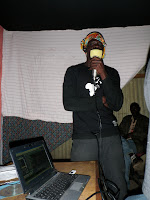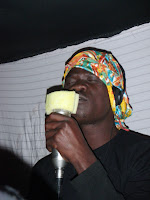With One-B, Jacky Zebraz, X-Cute, Madcat, Norbert Otieno, Whipstar, Oskar Dun, ii, Time Shield, Brother Sister Records producers and Raphael Omondi from Pamoja Youth Organization in Kibera, Nairobi
The Mobile Rekodi Situdio is a community based not-for-profit initiative I started in Kenya in 2010 working with Raphael Omondi from the Pamoja Youth Foundation based in the Kibera slums in Nairobi. The aim of the project was to offer the opportunity for musicians living in Kibera to have their music recorded.
Kibera is purportedly the largest slum in Africa though in many ways it doesn't match with the ideas one might have about an African slum. It does suffer from all the failings of urban high density living in sub-Saharan Africa such as poor and improvised housing, unreliable electricity, unclean drinking water and a complete lack of sanitation services. However, its inhabitants do not live in abject misery and the majority of residents of Kibera are engaged in work of some sort whether they have jobs in the city, run informal businesses in the township itself or 'hustle'. It is a thriving and vibrant place where you can get pretty much anything and the only area in Nairobi where you can buy a decent meal for 50 shillings. It says much for the global reach of the Internet and the contradictions inherent in Kibera that the best way to get a message out to a lot of people fast is through Facebook.
Kibera is purportedly the largest slum in Africa though in many ways it doesn't match with the ideas one might have about an African slum. It does suffer from all the failings of urban high density living in sub-Saharan Africa such as poor and improvised housing, unreliable electricity, unclean drinking water and a complete lack of sanitation services. However, its inhabitants do not live in abject misery and the majority of residents of Kibera are engaged in work of some sort whether they have jobs in the city, run informal businesses in the township itself or 'hustle'. It is a thriving and vibrant place where you can get pretty much anything and the only area in Nairobi where you can buy a decent meal for 50 shillings. It says much for the global reach of the Internet and the contradictions inherent in Kibera that the best way to get a message out to a lot of people fast is through Facebook.
As the work was not planned, but rather improvised in response to circumstances many aspects of the project did not turn out as I had expected and I feel I made some errors of judgment. However, the Mobile Rekodi Situdio has been in many ways a success and it was a matter of approaching the implementation of the project as an ongoing process of negotiation.
The first thing I had to adjust my expectations to were the type of musicians I was going to record and the styles of music they would play. Initially, I had intended to collect as wide a range of styles as possible and hopefully reach older generations of musicians in order to document traditional songs that might otherwise be lost, However, since the poster was disseminated via Facebook, the audience I eventually attracted was necessarily restricted to the younger generation and as it turns out mainly young men rapping in swahili in the 'local' Kenyan hip-hop, r'n'b, ragga and reggae styles.
In addition to this, my initial intention had been to record the musicians and give them copies of their songs on the spot but because of technical difficulties and the fact that the raw recordings needed extensive mixing, mastering and production work to deliver professional quality songs which would match the artists expectations I decided to take the vocal tracks back to Australia and distribute them to various musicians and producers in Melbourne. Together with the independent record label Brother Sister Records I have put together a compilation album with the vocal tracks recorded by the Kenyan MC's put to beats by various producers from Melbourne, Australia.
I only became aware of the most complicated unintended consequence of the project a day after we finished the recordings. Initially, I had thought we would conduct the recording sessions in the studios of Pamoja FM which is the local community radio station for Kibera. However as a result of mis-communication, Raphel Omodi had actually intended the event to take place in the facilities of the Pamoja Youth Foundation which is a few hundred meters down the road from Pamoja FM. This in itself presented no major problem but it resulted in the recording sessions being available to one section of the community at the exclusion of all others. Historically, Kibera began as land bestowed by the British colonial administration to the Nubians, an ethnic group from Sudan who had served as members of the King's African Rifles during World War I and II. However, they were never given title deeds to the land and as increasing rural to urban migration took place after Kenyan Independence other tribes from around the country began to settle in Kibera, encroaching on the Nubians land and gradually superseding the Nubian majority. By the 1970's, the largest tribal population were the Luo from Western Kenya and in the 1990's and 2000's, there were several violent clashes between the Nubians and Luo and since then there has been a sharp territorial division between the two groups in Kibera. Knowing members of both the Luo and Nubian community, I had intended to make the facility available to both communities however, because the offices of the Pamoja Youth Foundation were in a dominantly Luo area, it was insecure for the Nubian musicians go there. One of the Nubian musicians compared the situation to the east coast/west coast rivalry in American gangster rap, and when I spoke to the group the next day they vocally expressed their dismay at the project that was another example of the marginalization of the Nubian community by an exclusionary Kenyan state. I was genuinely mortified by this and it underlined how difficult it is to implement any project in such an environment without producing a snowballing effect of unintended consequences, especially in a place like Kenya where 'tribalism' is still one of the key issue that dominate the social and political landscape.
The question has become how to continue the project in such a way as to serve both communities equally. I am aware that I didn't create these problems and that I am not going to solve them, but hopefully I can negotiate a path which does not perpetuate or aggravate these tensions.
Listen to full album on soundcloud here
Listen to full album on soundcloud here
Mama-Jacky Zebraz (remixed by Erothug & Sam Hancocks)
Puff da cig-Madcat (prod. kharkov)





























